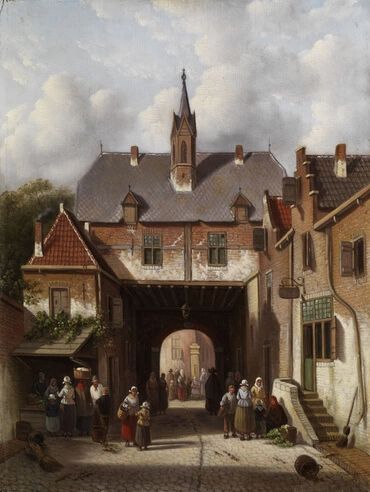Gate

Gates" in ancient times had a significance that does not hold in the modern world. Cities then were enclosed by walls for protection; gates in the walls let people in and out to do their business, but were also the weak points in the cities' defenses. In the Bible, cities on one level represent the minds of individual people. On a broader level, they represent beliefs shared by a community. The gates, then, represent openings where the Lord can feed us an understanding of truth and a desire for good. They also represent points where the hells can invade and sway us with false ideas and evil desires. We are kept in balance during our lifetimes, with influences from both the Lord and from hell. Ideally, we will over our lifetimes continue to invite the Lord farther and farther in and drive the hells back until ultimately the Lord can occupy our minds completely. And that point our belief in Him and His power and love will hold the gates and deny evil any entrance. As individuals, we at that point become angels. As communities, we at that point become part of the Lord's church. And at that point the gates become an entry point, introductory truths that allow people to enter churches and start bringing the Lord into their lives.
Arcana Coelestia#1866
1866. 'From the river of Egypt to the great river, the river Phrath' means the extension of spiritual and celestial things, 'to the river of Egypt' being the extension of spiritual things, 'to the river Phrath' the extension of celestial things. This is clear from the meaning of 'the river of Egypt' and from the meaning of 'the great river' or the Euphrates. That these rivers mean the extension of spiritual and celestial things becomes clear from the meaning of 'the land of Canaan' as the Lord's kingdom in heaven and on earth, in which kingdom there is nothing else than the spiritual things of faith and the celestial things of mutual love. Consequently nothing else can be meant by the borders of the land of Canaan than the extension of those things. For what the land of Canaan is, what the river of Egypt is, and what the great river, the Euphrates, is, the inhabitants of heaven do not know at all. Indeed they do not know what the borders of any land are; but they do know what the extension of spiritual and celestial things is, and the range and limits of the states belonging to them. These are the things which those in heaven have in mind when such things in the letter are read by man, so that the letter and its historical sense which has served as a basis for heavenly ideas disappears.
[2] The reason why 'the river of Egypt' means the extension of spiritual things is that 'Egypt' means factual knowledge which, together with the rational concepts and the intellectual concepts which a person has, constitute spiritual things, as stated already in 1443 and elsewhere in this volume. And as to why in the internal sense 'Egypt' means factual knowledge, see 1164, 1165, 1186, 1462. That 'the river Euphrates' means the extension of celestial things becomes clear from the lands which that river bounded and marked off from the land of Canaan, and by which in many other places facts and the cognitions of celestial things are meant. Here however because it is called 'the river', and 'the great river', they are nothing other than celestial things and the cognitions of them, for 'the great river' and greatness are used in reference to these.






